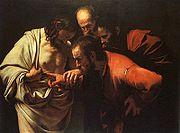- Doubt
-
Part of a series on God General conceptions Agnosticism · Apatheism · Atheism
Deism · Henotheism · Monolatrism
Monotheism · Panentheism
Pantheism · Theism · TranstheismSpecific conceptions Creator · Demiurge · Devil · Father
In particular religions
Great Architect · Monad · Mother
Supreme Being · Sustainer · The All
The Lord · Trinity · Tawhid · Ditheism
Monism · Personal · Unitarianism
Abrahamic (Bahá'í · Christianity
Islam · Judaism) · Ayyavazhi
Buddhism · Hinduism · Jainism
Sikhism · ZoroastrianismAttributes Eternalness · Existence · Gender
Names ("God") · Omnibenevolence
Omnipotence · Omnipresence
OmniscienceExperiences and practices Belief · Esotericism · Faith
Fideism · Gnosis · Hermeticism
Metaphysics · Mysticism
Prayer · Revelation · WorshipRelated topics Euthyphro dilemma · God complex
Neurotheology · Ontology
Philosophy · Problem of evil
Religion · Religious texts
Portrayals of God in popular mediaCertainty series Agnosticism
Belief
Certainty
Doubt
Determinism
Epistemology
Estimation
Fallibilism
Fatalism
Justification
Nihilism
Probability
Skepticism
Solipsism
Truth
UncertaintyDoubt, a status between belief and disbelief, involves uncertainty or distrust or lack of sureness of an alleged fact, an action, a motive, or a decision. Doubt brings into question some notion of a perceived "reality", and may involve delaying or rejecting relevant action out of concerns for mistakes or faults or appropriateness. Some definitions of doubt emphasize the state in which the mind remains suspended between two contradictory propositions and unable to assent to either of them[1] (compare paradox).
The concept of doubt covers a range of phenomena: one can characterise both deliberate questioning of uncertainties and an emotional state of indecision as "doubt".
Contents
Impact on society
Doubt sometimes tends to call on reason. Doubt may encourage people to hesitate before acting, and/or to apply more rigorous methods. Doubt may have particular importance as leading towards disbelief or non-acceptance.
Politics, ethics and law, with decisions that often determine the course of individual life, place great importance on doubt, and often foster elaborate adversarial processes to carefully sort through all available evidence.
Societally, doubt creats an atmosphere of distrust, being accusatory in nature and defacto alleging either foolishness or deceit on the part of another. Such a stance has been fostered in Western European society since the Enlightenment, in opposition to tradition and authority.
Psychology
Psychoanalysts[who?] attribute doubt (which they may interpret as a symptom of a phobia emanating from the ego) to childhood, when the ego develops. Childhood experiences, these traditions maintain, can plant doubt about one's abilities and even about one's very identity.
Cognitive mental as well as more spiritual approaches abound in response to the wide variety of potential causes for doubt. Behavioral therapy — in which a person systematically asks his own mind if the doubt has any real basis — uses rational, Socratic methods. This method contrasts to those of say, the Buddhist faith, which involve a more esoteric approach to doubt and inaction. Buddhism sees doubt as a negative attachment to one's perceived past and future. To let go of the personal history of one's life (affirming this release every day in meditation) plays a central role in releasing the doubts — developed in and attached to — that history.
Philosophy
Descartes employed Cartesian doubt as a pre-eminent methodological tool in his fundamental philosophical investigations. Branches of philosophy like logic devote much effort to distinguish the dubious, the probable and the certain. Much of illogic rests on dubious assumptions, dubious data or dubious conclusions, with rhetoric, whitewashing, and deception playing their accustomed roles.
Theology
Doubt that god(s) exist may form the basis of agnosticism — the belief that one cannot determine the existence or non-existence of god(s). It may also form other brands of skepticism, such as Pyrrhonism, which do not take a positive stance in regard to the existence of god(s), but remain negative. Alternatively, doubt over the existence of god(s) may lead to acceptance of a particular religion: compare Pascal's Wager. Doubt of a specific theology, scriptural or deistic, may bring into question the truth of that theology's set of beliefs. On the other hand, doubt as to some doctrines but acceptance of others may lead to the growth of heresy and/or the splitting off of sects or groups of thought. Thus proto-Protestants doubted papal authority, and substituted alternative methods of governance in their new (but still recognizably similar) churches.
Christianity often debates doubt in the contexts of salvation and eventual redemption in an afterlife. This issue has become particularly important in Protestantism, which requires only the acceptance of Jesus, though more contemporary versions have arisen within Protestant churches that resemble Catholicism. The debate appears less important in most other theologies[who?], religions and ethical traditions.
Doubt as a path towards (deeper) belief lies at the heart of the story of Saint Thomas the Apostle. Note in this respect the theological views of Georg Hermes:
... the starting-point and chief principle of every science, and hence of theology also, is not only methodical doubt, but positive doubt. One can believe only what one has perceived to be true from reasonable grounds, and consequently one must have the courage to continue doubting until one has found reliable grounds to satisfy the reason.[2]
Christian existentialists such as Søren Kierkegaard suggest that for one to truly have belief in God, one would also have to doubt one's beliefs about God; the doubt is the rational part of a person's thought involved in weighing evidence, without which the belief would have no real substance. Belief is not a decision based on evidence that, say, certain beliefs about God are true or a certain person is worthy of love. No such evidence could ever be enough to pragmatically justify the kind of total commitment involved in true theological belief or romantic love. Belief involves making that commitment anyway. Kierkegaard thought that to have belief is at the same time to have doubt.[3][4]
Law
Most criminal cases within an adversarial system require that the prosecution proves its contentions beyond a reasonable doubt — a doctrine also called the "Burden of Proof". This means that the State must present propositions which preclude "reasonable doubt" in the mind of a reasonable person as to the guilt of defendant. Some doubt may persist, but only to the extent that it would not affect a "reasonable person's" belief in the defendant's guilt. If the doubt raised does affect a "reasonable person's" belief, the jury is not satisfied beyond a "reasonable doubt". The jurisprudence of the applicable jurisdiction usually defines the precise meaning of words such as "reasonable" and "doubt" for such purposes.
Science
Many scientific advances have been started by doubt on preceding hypothesis.
See also
- Doubting Thomas
- Fear, uncertainty and doubt
- List of ethics topics
- Methodic doubt
- Philosophical skepticism
- Question
- Reasonable doubt
- Skepticism
Notes and references
- ^ See for example: Sharpe, Alfred. "Doubt". The Catholic Encyclopedia, Vol. 5 (New York: Robert Appleton). http://www.newadvent.org/cathen/05141a.htm. Retrieved 2008-10-21. "A state in which the mind is suspended between two contradictory propositions and unable to assent to either of them."
- ^ Schulte, Karl Joseph (1910). "George Hermes". The Catholic Encyclopedia. 7. New York: Robert Appleton. http://www.newadvent.org/cathen/07276c.htm. Retrieved 2008-10-21.
- ^ Concluding Unscientific Postscript to Philosophical Fragments, ed. by Howard V. Hong and Edna H. Hong, v. 1, Princeton University Press, 1992, pp. 21–57
- ^ Soren Kierkegaard's Journals and Papers, trans. Hong and Malantschuk, p.399.
Further reading
- Berger, Peter L. and Zijderveld, Anton (2009). In Praise of Doubt: How to Have Convictions Without Becoming a Fanatic. New York: HarperOne. ISBN 978-0061778162. A book by two eminent sociologists, one American and the other Dutch.
- Hecht, Jennifer Michael (2003). Doubt: a history: the great doubters and their legacy of innovation from Socrates and Jesus to Thomas Jefferson and Emily Dickinson. San Francisco: HarperSanFrancisco. ISBN 0-06-009795-7. This book traces the role of doubt through human history, all over the world, particularly regarding religion.
- Hein, David (Winter 2006). "Faith and Doubt in Rose Macaulay's The Towers of Trebizond". Anglican Theological Review 88 (1): 47-68. ISSN 0003-3286.
Categories:- Epistemology
- Skepticism
- Emotions
Wikimedia Foundation. 2010.



